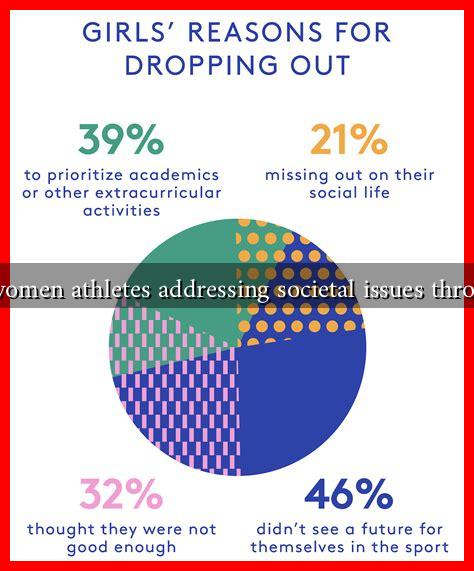-
Table of Contents
- How Are Women Athletes Addressing Societal Issues Through Sports
- The Power of Advocacy in Sports
- Gender Equality: A Fight for Fairness
- Promoting Body Positivity
- Mental Health Awareness: Breaking the Stigma
- Social Justice: Using Sports as a Platform
- Conclusion: The Impact of Women Athletes on Society
How Are Women Athletes Addressing Societal Issues Through Sports
Women athletes have increasingly become powerful voices in addressing societal issues, leveraging their platforms to advocate for change. From gender equality to mental health awareness, female athletes are not just competing in their respective sports; they are also championing causes that resonate with millions around the globe. This article explores how women athletes are using their influence to tackle pressing societal issues, providing examples and insights into their impactful initiatives.
The Power of Advocacy in Sports
Sports have always been a reflection of society, and women athletes are harnessing this connection to advocate for various causes. Their visibility and influence allow them to reach a broad audience, making their messages more impactful. Here are some key areas where women athletes are making a difference:
- Gender Equality: Female athletes are at the forefront of the fight for equal pay and opportunities in sports.
- Body Positivity: Many women athletes are challenging traditional beauty standards and promoting body positivity.
- Mental Health Awareness: Athletes are increasingly speaking out about mental health issues, breaking the stigma surrounding them.
- Social Justice: Women athletes are using their platforms to advocate for racial equality and social justice.
Gender Equality: A Fight for Fairness
One of the most significant issues women athletes are addressing is gender equality in sports. The disparity in pay and resources between male and female athletes has been a longstanding issue. For instance, the U.S. Women’s National Soccer Team (USWNT) has been vocal about their fight for equal pay. In 2020, they filed a lawsuit against the U.S. Soccer Federation, highlighting the wage gap between male and female players. Their efforts culminated in a landmark agreement in 2022, where the federation agreed to equalize pay for both teams.
Similarly, tennis champion Billie Jean King has been a pioneer in advocating for gender equality in sports. Her efforts led to the establishment of the Women’s Tennis Association (WTA) and the fight for equal prize money at major tournaments, which was achieved at the U.S. Open in 1973.
Promoting Body Positivity
Women athletes are also challenging societal norms regarding body image. Athletes like Serena Williams and Lizzo have used their platforms to promote body positivity and self-acceptance. Williams, who has faced criticism for her physique, has consistently advocated for embracing one’s body, regardless of societal standards. Her message resonates with many, encouraging women to celebrate their bodies and reject unrealistic beauty ideals.
Mental Health Awareness: Breaking the Stigma
The conversation around mental health has gained momentum in recent years, and women athletes are leading the charge. Gymnast Simone Biles made headlines during the Tokyo 2020 Olympics when she prioritized her mental health over competition. Her decision to withdraw from several events sparked a global conversation about the importance of mental well-being in sports.
Additionally, tennis star Naomi Osaka has been open about her struggles with anxiety and depression, advocating for mental health resources for athletes. Her candidness has encouraged others to seek help and has highlighted the need for mental health support in sports.
Social Justice: Using Sports as a Platform
Women athletes are also using their platforms to address social justice issues. The Black Lives Matter movement saw many athletes, including WNBA players, take a stand against racial injustice. The WNBA’s “Say Her Name” campaign, which honors Black women who have been victims of police violence, exemplifies how female athletes are using their influence to advocate for change.
Moreover, athletes like Megan Rapinoe have been vocal about LGBTQ+ rights, using their visibility to promote inclusivity and acceptance in sports and society at large.
Conclusion: The Impact of Women Athletes on Society
Women athletes are not just competitors; they are advocates for change, using their platforms to address critical societal issues. From fighting for gender equality and promoting body positivity to raising awareness about mental health and social justice, their efforts are reshaping the narrative around women in sports. As they continue to break barriers and challenge norms, their influence will undoubtedly inspire future generations to use sports as a vehicle for social change.
In summary, the impact of women athletes extends far beyond the playing field. Their advocacy work is crucial in addressing societal issues, making sports a powerful platform for change. As we continue to witness their efforts, it is clear that the future of sports will be shaped by these remarkable women who dare to speak out and make a difference.
For more information on the impact of women in sports, you can visit Women’s Sports Foundation.

